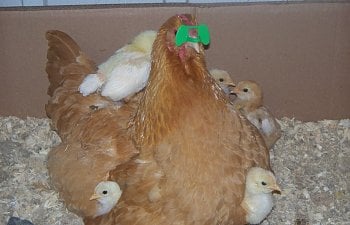Bullying is a very common issue that occurs mainly in times of stress or boredom, such as when two flocks are being integrated or the coop is too small. However harmless it may seem, when left unchecked, bullying can cause severe injury and even death. Here are some common causes of chicken behavioral issues.

Monitor birds frequently for any patches of lost feathers that could indicate bullying. If you are vigilant about keeping their environment interesting and reducing stress, the problem should sort itself out quickly.
- Boredom is a frequent cause of bullying. Ideally, birds would spend most of their day foraging, and when they do not have the ability to forage they find other less productive activities, such as pecking. This is why birds raised on wire floors are more prone to pecking; they have no substrate to sift through. This can often be countered by more outside time in a pen or free ranging. However, in the winter, when some may not have access to the outdoors, other measures must be taken.
- If you notice that one dominant chicken has been bullying the others, that chicken can be removed and put in solitary confinement for a few days up to a week. X-Pen or dog cage can be used as a pen. When the chicken returns, they will be at the bottom of the pecking order.
- If there are only occasional mild bullying squabbles, fill a tin can with pebbles and pennies, then put duct tape over the top. Keep this by the coop. Whenever they act up, immediately shake the can. The chickens will stop what they’re doing to find out what that awful noise is.
- To avoid bullying when introducing chickens, first allow the flocks to see each other through a fence. After they have become accustomed to each other, allow them to interact while free ranging. The extra space and distractions will allow the newcomers to escape if they are pecked. Then, it is best to leave them in the coop at night when they are sleeping. When integrating chicks, it isn't necessary for both flocks to be the same size, the newcomers should just be large enough to fend for themselves. When introducing chicks, you can create a "panic room" in the coop that the chicks can escape to if they are being pecked. This can be created by making a small opening in a dog crate that is large enough for the chicks but not for the older birds.
- Blinders are a device used to obscure a chicken’s view so they cannot accurately peck another chicken. However, these are not commonly used in backyard flocks.
- Excessive light exposure can also be a cause of pecking. Lights should be on for less than sixteen hours per day for adult birds. Also, if you are using a heat lamp in the brooder, a red bulb should be used. Overheating can also be a cause of behavioural issues in chicks because it is a source of stress, so make sure that the chicks are not too hot.
- Chickens must have adequate space to prevent bullying. Overcrowding is a surefire way to start pecking issues. If your coop is not as big as you’d like, at least allow the chickens to free range each day to diffuse the tension. Also make sure that there are enough feeders and waterers to go around because a lack of food can cause cause stress that can lead to pecking.
- If a chicken has an injury from pecking, remove the bird and ideally keep them in a separate area until they heal. However gruesome it is, other chickens will notice the blood on the area and peck it more. If you are not able to remove the chicken, clean the wound with saline solution and apply an antiseptic spray such as Blu-Kote that will not only keep the wound clean, but will also conceal the wound. You can also use an anti-picking solution that will help discourage the birds from pecking at it.
Monitor birds frequently for any patches of lost feathers that could indicate bullying. If you are vigilant about keeping their environment interesting and reducing stress, the problem should sort itself out quickly.


